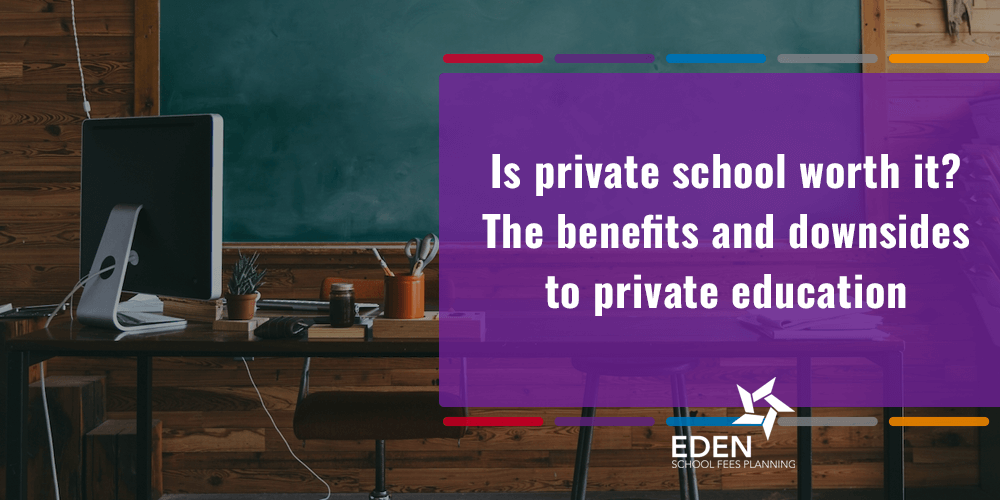
Is private school worth it? The benefits and downsides to private education
Choosing a school for your child can feel like one of the biggest decisions you make as a parent. A child’s education can make a life-long impact on their lives, so there’s a lot at stake. It’s a huge pressure to put yourself under, and the options can be bewildering or even overwhelming.
Parents often agonise about whether their child would do better with private education, or in a state school. What are the benefits and downsides of private education? Will it be worthwhile? After all, private school is potentially a larger investment than buying a house! So you want to make sure that private school is worth it.
To help you make the best choice for your family, let’s weigh up the advantages and disadvantages of sending your child to a private school.
Small is mighty: better class ratios
One of the main benefits of a private school is that pupils are (typically) in smaller-sized classes. With fewer pupils to each tutor, students are more likely to have more contact time with their teacher. It means the teacher can get a deeper understanding of how each child learns most effectively, tailoring their approach to give the very best learning experience.
Another upside is that children in a smaller class setting are potentially less likely to be distracted by their peers simply because there aren’t so many of them. They’re under closer supervision, too, so behavioural issues may be less common.
Naturally, private schools may say that this translates to happier, more engaged children who have more self-confidence and who tend to attain better results at exam time.
The research backs this up too, with 9 in 10 UK teachers saying that ‘bigger classes were damaging their ability to meet the needs of all pupils.’
Of course, with larger classes there’s more pressure not only on the teacher’s time, but also on equipment and resources – it could leave children waiting to have their turn, rather than spending their time learning.
What is the average class size for both private and state schools?
In the last decade, state school class sizes have increased on average from ‘23.39 in 2010-11 to 24.54 in 2020-21.’
By comparison, on average private schools’ class sizes have 16.1 pupils. Of course, this varies from school to school, and it’s a good idea to check with your preferred private school how many children are in each class.
According to the ISC (Independent Schools Council), ‘pupil-teacher ratio at ISC schools is 8.9:1. This compares with an average of 18.0:11 across all state-funded schools in 2022.‘
Potential difference: the possibility of higher attainment
It’s often assumed that smaller class sizes automatically lead to better grades – the higher levels of 1:1 time with a teacher means learning is advanced. Some studies also show that the greatest benefits of smaller class sizes come for children who are from minority or disadvantaged backgrounds.
But remember, your child is unique. They may have less interest in academia and a love of sport or art or music. We are all different, and yes, smaller class sizes may improve academic achievement but, ultimately they can’t make your child academically successful.
All in all, we advise our clients that it’s best to choose the school where your child will feel happiest, rather than chasing a specific academic result.
Learning unleashed: are private schools better at enriching children’s lives with subjects beyond English and STEM?
One of the main differences in sending your child to a private school is that, unlike state schools, the private education sector isn’t tied to the national curriculum. This gives private schools the opportunity to enrich children’s learning beyond the prescriptive and sometimes narrow focus on STEM subjects, bringing more time for broader subjects like sports, music or the arts.
If your child holds a particular interest or aptitude for a subject that doesn’t get much attention in the national curriculum, choosing a school that has a strong focus on it could bring them enormous joy and fulfilment.
One of the surprising benefits of private education is that it doesn’t just focus on academic subjects, there is often a broader variety of subjects a child can learn.
A lot of parents worry that their child is ‘not academic’ enough for private school education, but your child may not have to be academic. Passion, love and willingness to learn a particular subject is something a lot of private schools encourage.
Some of the subjects we’ve seen private schools offer (which often aren’t available in state schools) are:
- Golf
- Astronomy
- Debate practice
- Latin
- Piano
- LAMDA training (performing arts training certified by the drama school, LAMDA)
- Photography
- Fine art
- Ceramics
- Architecture
- Horse riding
- Chess
- Ballet
Do private schools follow the national curriculum?
Although private schools aren’t required to follow the national curriculum, they work hard to provide a rounded education, and usually offer a similar programme of topics to state schools. Occasionally, they choose to follow a curriculum or qualification from another country, like BTECs or International Baccalaureate diplomas in addition to A-levels, or IGCSEs instead of UK GCSEs at age 16.
Does this matter? Children considering university might be concerned that their qualifications wouldn’t be recognised by admissions if they deviate from the norm. But as long as the entrance criteria are met, universities are happy to consider applicants with a wide variety of equivalent qualifications.
The best thing to do is speak to your preferred private school and ask them what subjects and qualifications they offer, then check university criteria to ensure that they accept those qualifications.
Most private schools–and state schools alike–take pride in their students attending university education, so the likelihood is, the qualifications your private school offers will be accepted by universities.
Jolly holidays: what’s the difference between private and state school holidays?
Depending on your circumstances, private school holidays could be a benefit or a drawback for your family. Many private schools have different – and longer – school holidays than their state school counterparts. This is because private schools set their own term dates – they’re not bound by the dates decreed by the local authority.
For example, the majority of state schools will break up for school this year (2022) on Friday 22 July and return around the 1st of September.
Whereas, private schools may break up for summer sooner, such as this private school that breaks up on the 9th of July and restarts on the 5th of September. So that’s an extra week to account for.
But why do private schools have longer holidays? Private schools often have longer learning days, and some even require attendance on a Saturday, so pupils’ learning takes place over a shorter term, with extended holidays to compensate.
If you’re a working parent, this could mean you need to find extra childcare or holiday activities when your children aren’t in school. But on the other hand, it can mean cheaper, less busy summer holidays are available to your family because you can travel outside of peak demand.
Difference makes a difference
Sadly, one of the disadvantages of choosing a private education for your child is that they are less likely to be exposed to children from different backgrounds.
Without associating with peers from other cultures, religions, and social backgrounds, it can be harder for children to develop a broad worldview and an appreciation of difference. This, of course, is dependent on the private school you choose. For example, some private schools that are also boarding schools could have a more diverse student body as they teach children who come from different countries.
But remember, whichever private school you choose, the majority of your child’s friends will be from families who can afford to pay for private school education. They are not seeing a true reflection of the world or even the UK.
Student welfare: how does private school differ from state school?
A recent study by York University found that in some areas of life, children at private schools fared worse than those in state schools.
The study found that private secondary school children were more likely to experience bullying in a private school and that behaviours such as drinking alcohol were likely to start earlier.
However, when looking at overall well-being, it looks as though there is little difference between private schools and state schools. If you have specific questions or concerns, talk to your prospective school to find out how they care for pupil welfare and promote healthy relationships and responsible behaviours.
Counting the cost: the biggest drawback of private school education
One of the downsides to private education, particularly for parents, is the cost. Since private schools receive no funding from the government, their finances rely almost completely on school fees paid by parents.
So, what is the cost of private school? Although school fees can vary dramatically across the UK, a budget of £300,000 makes a good guideline for the cost of educating your child from the age of 4 to 18. The price can be much more or much less than this, so it’s worth researching the cost of several independent schools before making your decision.
With sums of this scale, many families could feel the financial strain if they don’t have expert guidance. We always advise our clients to think of school fees as an investment in your child, rather than as a monthly cost, and we help parents to make public school affordable without sacrificing their other financial goals.
So… is private school worth it?
Ultimately, only a parent – and their child – can decide whether private education is the right step for them. If you’re ready to look into private schooling and you’d like to find out what the financial impacts might be for your family, contact us. We can help you make private school affordable without compromising on your dreams.
Related Posts
How to find the right private school for your child
Does a private school education lead to a better career?
What to expect from private school entrance exams at different stages of education
Should you choose a private school that specialises in music or sport, or takes a broad approach to learning?
What private schools offer children with Special Educational Needs (SEN)
How the cost of living crisis could impact your ability to pay private school fees
The UK’s most affordable private schools: where can you find them?
What facilities do private schools offer?


